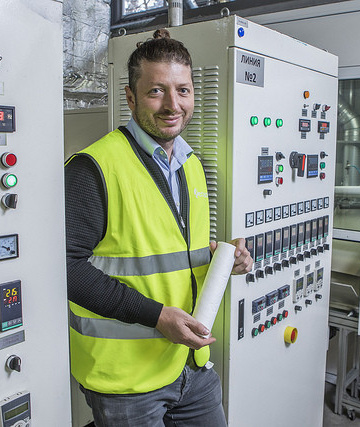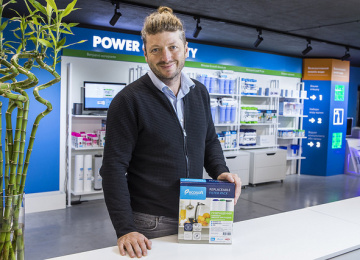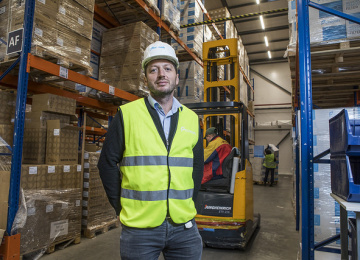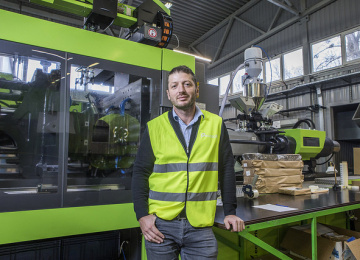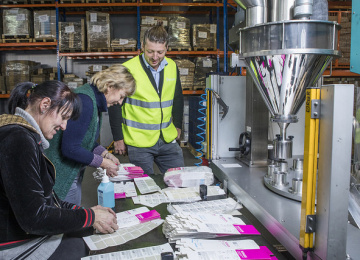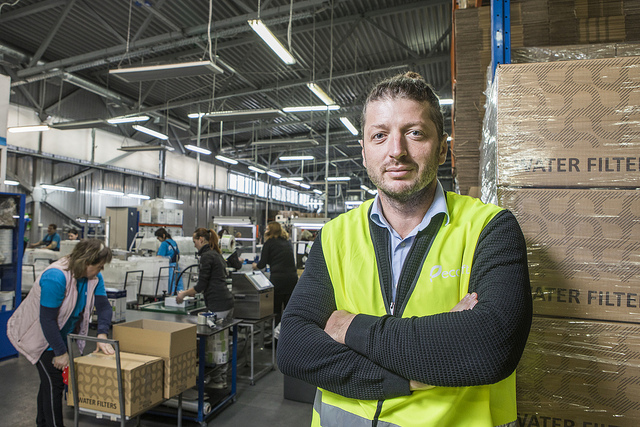
“When I see the big yellow and blue flag every day on my water filter and the inscription ‘Made in Ukraine with pride’, it makes me proud,” says Olga, 35, from Kyiv.“In fact, it’s very satisfying that such high-quality goods are being produced in our country.” For three years, Olga’s family has been using the reverse osmosis cleaning system manufactured by Ecosoft. The proud Kyiv resident says she is very pleased with the quality of the equipment and has even bought two of the systems as gifts for her friends.
Indeed, Ecosoft products, with the exception of some chemical components, are made almost entirely in Ukraine. The company, which is located in the town of Irpin, near Kyiv, produces not only the reverse osmosis water treatment equipment, but also pitchers and other components for household filters. In addition to consumer products, Ecosoft offers solutions for industrial and catering applications, cafés and hotels. The company also runs a project called Healthy Water. This is a network of purified water vending machines controlled remotely using a GPRS module. Ecosoft’s sales for 2018 reached $20 million, with 330 people currently employed.
In early December, it became known that the Ukrainian manufacturer was to be bought by the Austrian company BWT Aktiengesellschaft. This a landmark event for the local market, as foreign investors are still wary of acquiring assets in Ukraine.
However, Ecosoft is a special business. The company not only makes high-quality products that have captured a third of the retail market in Ukraine, but it has also implemented a management system that is based on the world’s best practices.
This is the result of working with the EBRD since 2012.
As part of the Bank’s advisory programme, small and medium-sized enterprises (SMEs) receiveadvice from leading local and international business experts for around 16% of the total cost of their services. The rest is funded by the European Union (EU) through the EU4Business initiative and the governments of Sweden and the United States. “Thanks to this support, Ecosoftwent from being a family company to a professionally run business,” says Andriy Mitchenko, one of the founders of the company. “We had an emotional approach to business,” he explains. “Being a good person was more important to us than being a professional, for example. But after working with the consultants, Ecosoft became a more prudent company. We no longer base our decisions on emotions.”
Water world
Ecosoft’s name is made up of two words – “ecology” and “software” – and there is a reason for this. At first, the company planned two lines of business: the development of water purification technologies and software. “My dad is a cybernetics engineer and my mum is a chemical engineer,” Mitchenko says, explaining the unusual combination. He joined his parents’ business in the early 2000s, although Ecosoft has been active since 1991.
This was immediately after the collapse of the Soviet Union, when Ukrainian enterprises, including the food sector, were becoming commercial and quickly faced the need for water purification. During the Soviet era, with its planned economy, there was no great need for it. Enterprises just drilled wells, regardless of cost, until they found water of the required quality. With the advent of the market economy, however, companies had to watch their costs. This was where Ecosoft’s engineers came in, developing technological projects that raised the extracted water to the required standards. “We produced technology development reports, for example, on the production of water for beverages,” says Mitchenko. Ecosoft quickly found customers not only among producers of soda water and beer, but also among power plants that needed to prepare water for their process flows, as well as among large chemical enterprises.
The company first developed its own filtering mixture in 1998. By this time, software development had faded into insignificance, and Ecosoft’s laboratory chemists came up with the Ecomix filtering mixture. “This material is able to soften water and remove iron at the same time,” explains Mitchenko.
However, entering the mass market was still a long way off: the company had a good filtering medium, but it was not yet able to package it for consumers. “We took the mixture, put it into a plastic bottle, connected some tubes, and filtered the water through this makeshift device,” Mitchenko recalls with a smile. “The water was very good, but it didn’t look so good.”
It took around ten years for the company’s inventions to start paying off, at the end of the 2000s. The market for the development of industrial systems became crowded when leading Russian and European players entered Ukraine.
By this time, however, Ecosoft had come up with a more attractive consumer design for its household filters. They began the mass production of pitcher filters containing their own proprietary filtering mixture. “We started by outsourcing,” Mitchenko recalls, “and placed orders in China.” The company opened its first production facility for household filters in 2009.
Ecosoft products quickly won over the Ukrainian market. Today, the company holds about 30% in its segment. Mitchenko credits the company’s success to the fact that it produces filters well suited to the peculiarities of Ukrainian water.
Water the planet
In 2013, Ecosoft began to actively promote its products to the European market, where it offers its industrial solutions. And like in Ukraine, the company adapts to the peculiarities of the local water. “In Ireland, there are problems with iron; in Spain and Norway, water mineralization is high,” says Mitchenko.
Exports account for 30% of Ecosoft’s total sales, with most of the shipments going to EU countries. “We do not focus on markets outside the EU,” explains the company’s CEO, “because, as a manufacturer, our biggest advantages are in Europe”. First and foremost, Europe’s geographical proximity to the company’s production facility in Ukraine.
The EU is not just a target market for Mitchenko’s company, however. Thanks to the advisory support provided by the EBRD, the company has risen to a whole new level. “We have really systematised our approach to business,” he says, explaining that, as part of this support, Ecosoft collaborated with an expert from Belgium.
The company highly values his work: “He introduced us to the best management practices,” says Mitchenko, “and was sufficiently proactive and persistent in bringing them to fruition.” According to the top manager, the project was aimed at turning family chaos into a professionally run company.
At the beginning of 2017, the Ukrainian company received a $3 million loan from the EBRD. This helped the company to grow further and, even more importantly, to provide customers with access to clean water at affordable rates. So it’s not only good for business, but also for people. This is fully in line with Ecosoft’s mission: “To give pure water to as many people as possible”.
Author: Katerina Shapoval
The article was prepared for the EU4Business initiative.

